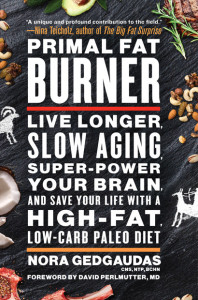GLUTEN IS THE FALL GUY: GOING GRAIN-FREE IS BETTER
A look inside the new book Primal Body – Primal Mind by Nora Gedgaudas, CNS, CNT
By Elaine Fawcett, MJ, NTP
Despite being the “staff of life,” gluten’s list of transgressions against good health is enough to fill several books, not to mention countless exam tables and hospital beds. As many now know, a gluten-free (and often dairy-free) diet is a good place to start when struggling with a health affliction.
However gluten, in all its nefariousness, is a bit of a fall guy. Although a gluten-free diet can go a long way toward resolving health issues, it might not score the touchdown. In fact, a gluten-free diet is to eating what marijuana is to drug abuse – the gateway to something more powerful.
To achieve true health, according to the book Primal Body – Primal Mind: Empower your total health the way evolution intended (…and didn’t) by Nora Gedgaudas, CNS, CNT, we must give up not just gluten but all grains entirely. This may have your friends and relatives rolling their eyes at the dinner table, but, as the book explains, we’re simply not physiologically equipped to handle grain. Archeology and anthropology show that once hunter-gatherer humans (to whom we are 99.99% genetically identical) widely implemented agriculture, they experienced a decline in human stature, bone density, dental development and health, and an increase in birth defects, malnutrition and degenerative diseases. Although our farming ancestors rendered grains more digestible through sprouting, fermenting, proper storage and not tinkering with it genetically, Primal Body – Primal Mind explains that health is declining at an alarming rate in this country. Diseases that once belonged to the old now afflict the young, and our genetic resilience has waned considerably. We are Pottenger’s cats in action, and while grains have always been a hardship on the human body, they are now one we can no longer weather.
Although it may shock your clients, the idea of a grain-free diet is nothing new to the nutritionally savvy. Grains contain anti-nutrients, are low in tryptophan these days, and high in omega 6 (“There is no human dietary grain requirement,” writes Gedgaudas), but their real downfall is the sheer number of carbohydrates they pass along. As can be expected, the author provides ample evidence to warn readers away from not only grains, but high-carbohydrate foods in general, including sweeteners, potatoes, starchy vegetables, legumes, and most fruits.
While the book details the myriad ways carbohydrates rob you of good health (in which NTPs are well grounded), Primal Body – Primal Mind uses cutting-edge research to depart from low-carb and Paleo diets in some fundamental ways. Most interesting are the nods to the influence of insulin in longevity. Gedgaudas’ review of the scientific literature shows that how much insulin we produce throughout our lives determines how long we live. Why? Because insulin’s primary role is not to lower blood sugar, but rather to coordinate the body’s energy stores with lifespan and reproduction. In other words, insulin, an ancient molecule found in most all life forms, regulates whether we are in the mode to store fat and reproduce, or to focus attention on cellular repair and regeneration. A high-carb diet requires constant surges of insulin, putting your body into fat-storing and baby-making mode. When you cut out the carbs and hence the insulin surges, your body assumes “the hunting is good” and there’s no need to shore up for hard times ahead. Instead it can direct energy toward bodily repair, regeneration and maintenance – otherwise known as staying young.
Even more fascinating is the role protein plays in lifespan and reproduction. Anyone with a history of low-carb dieting remembers those diets that promote liberal amounts of protein. According to Primal Body – Primal Mind, this sabotages your low-carb efforts; any protein not required by the body is converted to glucose and then ultimately to fat for storage: “We want just enough protein to meet the demands of our own repair, regeneration and basic maintenance needs that can extend our own longevity, enhance our own health and possibly even reverse signs of aging.”
Any more protein than this, and it’s surprisingly little, kick starts a pathway that leads to cell proliferation, such as in fat storage, reproduction and growth, but also, unfortunately, cancer. Down regulating both this protein pathway and insulin in turn triggers the up-regulation of cellular repair, regeneration and maintenance… the essence of longevity.
Furthermore, a high-protein diet, even in the absence of carbs, not only promotes fat storage, but worse, promotes a “sugar-burning” metabolism that relies on glucose for energy. Better, according to Primal Body – Primal Mind, is a metabolism that runs on ketones, the energy derived from fat.
When it comes to fat, the Primal Body – Primal Mind diet gets fun, and doable. If you’ve read the research on a calorie-restricted diet, you know it’s the key to enjoying optimal health into a ripe old age. But the thought of a calorie-restricted diet also sounds agonizing (at least to me!).
That’s where Primal Body – Primal Mind breaks the mold. Gedgaudas’ review of the scientific literature shows that calorie-restricted diets work because they are restricting the insulin surges and cell proliferation that go along with high-carb, high-protein diets. What falls outside these rules is an abundance (but not excess) of healthy, natural fats – the sort our hunter-gatherer ancestors prized. According to Primal Body – Primal Mind, humans and hominids have been using ketones, the energy created from burning fat, for fuel instead of glucose for close to three million years. Ketosis (not to be confused with ketoacidosis, a serious condition affecting primarily those with Type I diabetes) provides the body with a steady, long-burning source of energy and isn’t destructive in the way excess insulin and glucose are when the body is in sugar-burning mode. Glucose, Gedgaudas reminds us, was designed for an energy source only in states of emergency, not for daily life. No wonder we’re all so stressed out.
Switching your body from a sugar-burner to a fat-burner doesn’t happen overnight. In fact, it usually takes four to six weeks. However, Primal Body – Primal Mind helps you ease the transition with recommendations for nutritional supplements, and then further recommendations that keep you sailing smoothly once you’ve settled into fat-burning mode.
Although a Primal Body – Primal Mind diet can make you feel like you’re from another planet in social situations, it rewards you with increased energy, better brain health (Gedgaudas’ day job is, after all, working with peoples’ brains as a neurofeedback practitioner), balanced hormones and, if necessary, weight loss. And – the icing on the cake you’ll no longer be eating – it also rewards you with a smaller grocery bill. By eliminating carbs and avoiding excess protein, meals shrink considerably in size…and cost. Thanks to all the fat, however, they’re still satisfying. “You’ll be shocked by how much money you save and how satisfying this little protein can be,” the author writes. “Trust me. I was.”
Primal Body – Primal Mind goes into much more detail on how to properly adapt this way of eating than this article presents. It also includes surprising information on exercise (which you will find a relief), menu plans and nutritional supplements.
Gedgaudas will teach about topics covered in her book in a one-day seminar, “Primal Mind: Nutrition and Health in the Modern World,” scheduled for Saturday, June 6. Sponsored by Seven Waves Alliance for Functional Wellness, the cost of the seminar is $89 for registration prior to May 15, $99 thereafter, and $49 for students and 2009 NTP graduates. To register, please visit www.sevenwaveswellness or call 503-278-7505.
To order the book and read Gedgaudas’ blog, please visit www.primalbody-primalmind.com.
FOR MORE INFORMATION ABOUT THE NUTRITIONAL THERAPY ASSOCIATION GO TO:
Nutritional Therapy Association, Inc.
(800) 918-9798




Leave a Reply